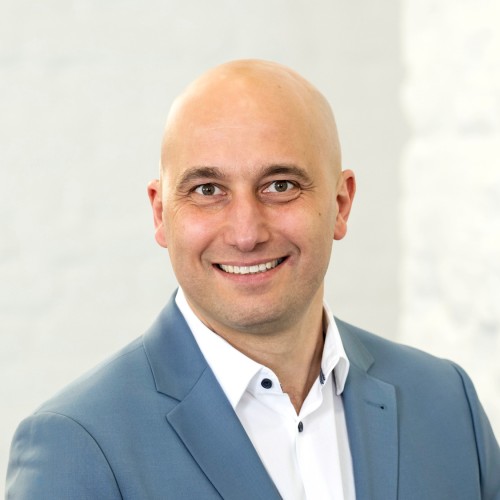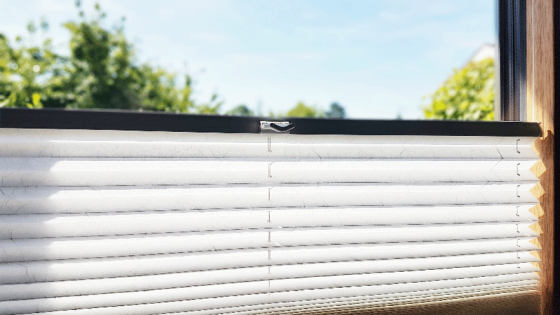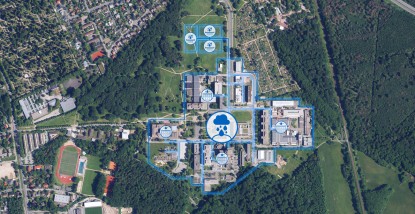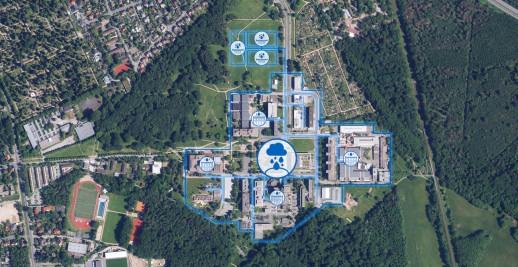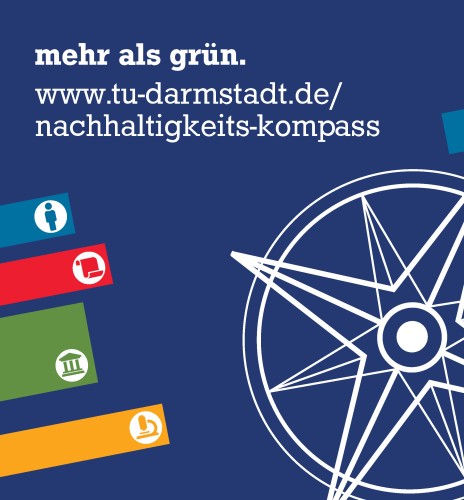Due to system losses during the conversion of natural gas into the respective energy type, the TU's annual consumption in 2022 for electricity amounts about 51,100 MWh, heat about 48,700 MWh and cooling about 8,100 MWh. Together, this amounts to about 110,000 MWh of energy. This is roughly equivalent to the energy consumption of all households in a small town like Griesheim.
In 2023, annual consumption at TU Darmstadt could be reduced as follows: for heat from 48,700 MWh to 39,300 MWh (- 20 %), for electricity from 51,100 MWh to 48,200 MWh (- 6%) and for cooling from 8,100 MWh to 6,500 MWh (- 20 %).
Over 90% of the energy supply is covered by contracting, a contract concluded specifically for this purpose. The contractor operates the energy center on the Lichtwiese campus and supplies the university with 40% heat from the Darmstadt North district heating network, which is fed by the Darmstadt waste-to-energy plant. 75% of the electricity is generated by combined heat and power plants and supplemented with 25% purchased electricity. In addition to the contractor´s central energy supply, and other decentralized properties of the TU that are supplied with energy via individual energy contracts.
The heat consumption of the buildings supplied via the energy center is monitored approx. every 15 minutes. The electricity quantities of the contractor are not building-specific, but the meter structure is currently being retrofitted. The aim is to establish the closest possible monitoring of energy consumption via a digital meter infrastructure. In the electricity supply, we know the consumption via the contractor's invoicing at monthly level, but not via the external electricity contracts.
2021, TU paid 20.5ct/kWh for electricity and 8.8ct/kWh for heat. This brought the total amount to approximately 11 million euros for electricity and 5.5 million euros for heat last year. For 2022, the energy prices agreed with the contractor will still apply. From January 2023, energy costs will rise significantly. The electricity supply is expected to double and the heat supply to triple.
The switch to LEDs is in full swing, but can only happen gradually. We prioritize based on the highest savings potential and the fit with other measures. As not only the light sources but often the lighting itself has to be replaced, independent replacement is unfortunately not possible for reasons of liability, warranty and occupational safety.
We generally recommend LED light bulbs from well-known, reputable manufacturers, as these generally offer good energy efficiency, a long service life and high-quality light. However, there is no fixed specification or obligation, so personal preferences or special requirements can also be taken into account when making a selection.
As far as procurement is concerned, light bulbs can be conveniently ordered from our wholesalers via the HELF system. However, there are no fixed specifications here either – orders can also be placed independently if this is easier or quicker.
TU Darmstadt has PV systems in the order of 2.1 MW under construction and in planning, both subsidized and unsubsidized by the state of Hesse.
The construction of 23 new plants is planned by the end of 2025. According to an initial rough calculation, this planned expansion will utilize approx. 1/3 of the potential roof areas.
The number of systems may change with regard to building planning and structural feasibility checks. In this case, alternative locations will be sought.
- Windows are replaced based on how they fit in with other measures and prioritized according to the highest savings measures, so that they are only replaced gradually.
- Inquiry: Can I find out when my building is due?
- There is no isolated renovation roadmap for windows. The refurbishment program of the future is currently being revised and is subject to a certain dynamic, so we cannot make any promises as to exactly when a building envelope will be refurbished.
These are technically easy to control on a small scale, e.g. For example in a household. For the complex and diverse structures at TU Darmstadt, it is currently not clear how costs and benefits relate to each other. In particular, it is not clear how high the costs for maintenance and support of the devices are and how the issue of battery waste is to be assessed. Against this background, it was decided not to use smart thermostats across the board for the time being.
In a scientifically monitored field test, which is meaningful in terms of scope, findings are to be gained as a basis for an evaluation. If you are interested in taking part in this field trial, please contact the energy management team.
There is no measurement technology in the buildings that are not connected to the district heating network. This means that no evaluable data is available.
Do you have a question and think that the answer would be of interest to many at TUDa? Then please contact us by Email so that we can keep this list updated.


